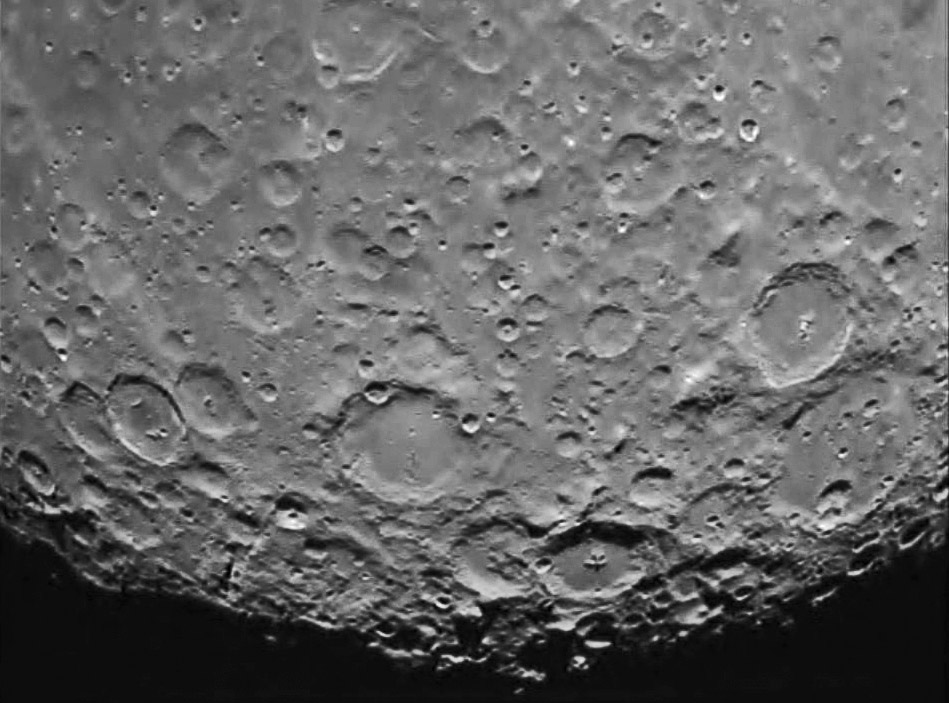Difference between revisions of "February 3, 2012"
| (2 intermediate revisions by the same user not shown) | |||
| Line 6: | Line 6: | ||
<em>image by [http://www.nasa.gov/mission_pages/grail/news/grail20120201.html NASA News - GRAIL]</em><br /> | <em>image by [http://www.nasa.gov/mission_pages/grail/news/grail20120201.html NASA News - GRAIL]</em><br /> | ||
<br /> | <br /> | ||
| − | This is not a very high quality image, but its perspective is unique and its possible consequences could be huge. Do you recognize the area? I immediately noticed the crater on the left with dark mare on the floor and two bright peaks on the mare edges. This is the 143 km wide farside feature [ | + | This is not a very high quality image, but its perspective is unique and its possible consequences could be huge. Do you recognize the area? I immediately noticed the crater on the left with dark mare on the floor and two bright peaks on the mare edges. This is the 143 km wide farside feature [[February_25,_2007|Antoniadi]] which is transitional between central peak craters and multi-ring basins. The second thing I noticed are the various isolated mountains such as the one near the terminator near bottom center. Another huge one is on the right above the large flat-floored crater. Look around and you will see other massive peaks. We usually see these peaks from another [[December_4,_2006|Bailly-Newton Basin]]? If so, the center is significantly misplaced. The first sentence here mentioned huge effect. The video that this image is from was made with a camera on the Ebb spacecraft, one of the two GRAIL spacecraft orbiting the Moon to measure its gravity field. Both Ebb and its sister craft Flow - great names! - carry video cameras to collect images for kids. The goal is to use these videos and images to inspire kids to become interested in the Moon, space, science, and hopefully to contribute to the future of America.<br /> |
<br /> | <br /> | ||
<em>[mailto:tychocrater@yahoo.com Chuck Wood]</em><br /> | <em>[mailto:tychocrater@yahoo.com Chuck Wood]</em><br /> | ||
<br /> | <br /> | ||
<strong>Related Links</strong><br /> | <strong>Related Links</strong><br /> | ||
| − | Rükl plate [ | + | Rükl plate [https://the-moon.us/wiki/R%C3%BCkl_72 72]<br /> |
<br /> | <br /> | ||
<p><b>Yesterday's LPOD:</b> [[February 2, 2012|Far West Lavas]] </p> | <p><b>Yesterday's LPOD:</b> [[February 2, 2012|Far West Lavas]] </p> | ||
Latest revision as of 17:46, 13 October 2018
Looking Poleward

image by NASA News - GRAIL
This is not a very high quality image, but its perspective is unique and its possible consequences could be huge. Do you recognize the area? I immediately noticed the crater on the left with dark mare on the floor and two bright peaks on the mare edges. This is the 143 km wide farside feature Antoniadi which is transitional between central peak craters and multi-ring basins. The second thing I noticed are the various isolated mountains such as the one near the terminator near bottom center. Another huge one is on the right above the large flat-floored crater. Look around and you will see other massive peaks. We usually see these peaks from another Bailly-Newton Basin? If so, the center is significantly misplaced. The first sentence here mentioned huge effect. The video that this image is from was made with a camera on the Ebb spacecraft, one of the two GRAIL spacecraft orbiting the Moon to measure its gravity field. Both Ebb and its sister craft Flow - great names! - carry video cameras to collect images for kids. The goal is to use these videos and images to inspire kids to become interested in the Moon, space, science, and hopefully to contribute to the future of America.
Chuck Wood
Related Links
Rükl plate 72
Yesterday's LPOD: Far West Lavas
Tomorrow's LPOD: A Holy Grail?
COMMENTS?
Register, Log in, and join in the comments.



